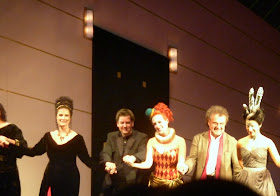 |
| Artistic philosophies go head to head. Photo (c) Oper Frankfurt/Monika Rittershaus |
The mercurial musical moods of the prologue were handled deftly: the conversation (if it can be called that when people are talking past each other) between the Haushofmeister and the Musiklehrer was unusually moving, but there were also moments of sly humor. There is at least the possibility that while the Komponist muses on art after his altercation with the lackey, absolutely everyone else is having sex behind closed doors. Although there are moments of sympathy between the artistic factions, tempers are running high when the entrance of the guests forces the end of the prologue. When the curtain opens again on the opera, everything was just different enough that I asked myself whether it was a dream landscape; I don't think it was, necessarily, but it was reminiscent of one, perhaps by Hitchcock, where individuals are forced into unaccustomed relationships with their surroundings. Ariadne's thread, that symbol of navigating perils, has been broken in pieces, and the denizens of the island make to mend it. At the outset, the efforts of the commedia troupe to insert themselves in the action are grotesquely miscalculated, but gradual adjustment takes place so that genuine interactions become the basis of a rapprochement. This may sound banal, but was sensitive and nuanced. The Komponist's vision, of course, is not fully realized; but working together, the artists--with the formerly opposed groups integrated--achieve something like transcendence.
 |
| Perfecting perspective: divinity of music. Photo (c) Oper Frankfurt/Monika Rittershaus |
Sebastian Weigle conducted a rendition of the score which emphasized the process of change rather than the surprises of transformation. Recording microphones were present, and honorably announced, but I didn't notice any significant distortion of sound. The rich orchestral colors were beautifully realized, but I could have wished for more variety in dynamics and tempo; for an opera where the appearance of Dionysios himself heralds the climax, it seemed a bit too orderly and Apollonian. The house was extremely enthusiastic, so mine may be a minority opinion. The impressive strength of the singers extended into small roles, with Peter Marsh a vocally arresting Tanzmeister. As the world-weary but still idealistic Musiklehrer, Franz Grundheber gave a nuanced, sympathetic performance, well-characterized through vocal color and diction. The three ladies of the island and the four men of the commedia troupe were all notable for individual characterization and chemistry with each other. The Harlekin of Daniel Schmutzhard was a stand-out, with a plangent baritone, excellent diction, and an irresistible warmth of presence.
 |
| In praise of the Augenblick... Photo (c) Oper Frankfurt/Monika Rittershaus |
Camilla Nylund made a truly regal Ariadne, with a silvery tone that could be ethereal, but also with impressive heft and stamina. Her characterization was impressive, both as the diva who sees herself as the center of activity, and the princess who is terrified by the idea of losing control (personae perhaps not so far apart as all that.) "Es gibt ein Reich" was deliciously intense (an earlier version here.) Nylund was believable in her craving for oblivion, as well as in the fear and tenderness which were shared by Bacchus. As the youthful god, Michael König exhibited great tone, not only coping with Strauss' infamous brutality towards tenors, but handling the crescendos in energy impressively. The diva's and the tenor's professional jealousies ironize the consummation which I had been getting teary over in a manner which Hoffmansthal would certainly have approved. But in the finale, all the artists are pleased with what has been achieved; the spectators join them in raising a glass to the Composer; perhaps all have been moved. He still sits apart, uncertain, but Zerbinetta insists on including him, and all are united in celebration, if hesitantly. And even such tentative, imperfect attempts at connection are--it is suggested--enough to justify our human attempts at heilige Kunst.
Curtain call photos (I'm still getting used to German-style bows:)
 |
| L-R: Bacchus, Ariadne, Weigle, Zerbinetta, Musiklehrer, Echo |
 |
| Komponist! |
No comments:
Post a Comment
Start a conversation!